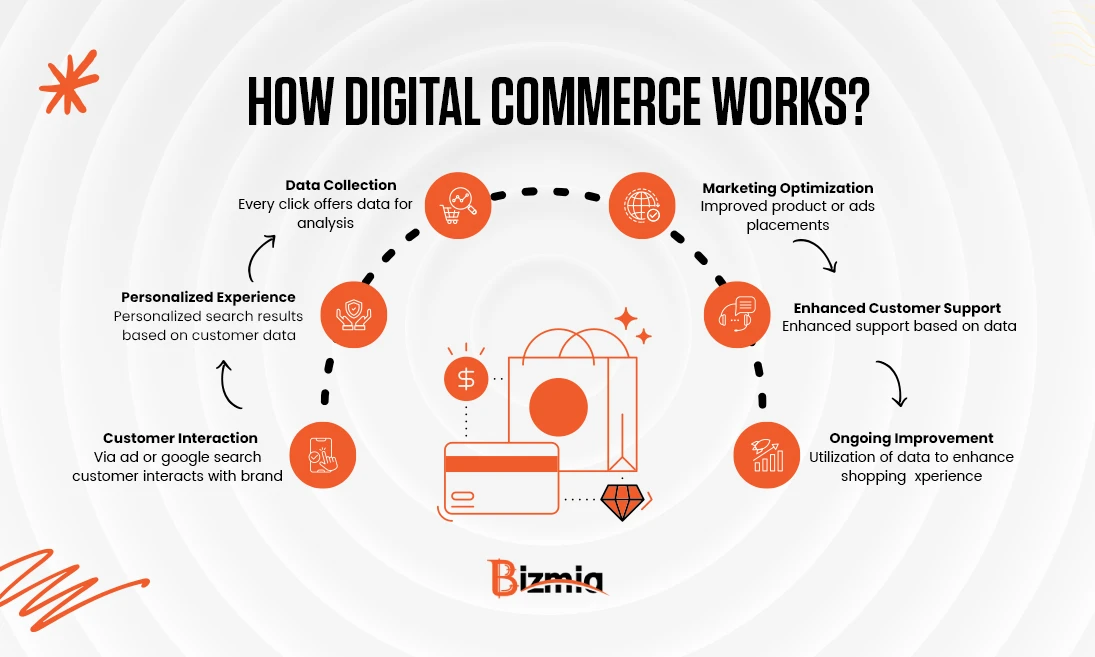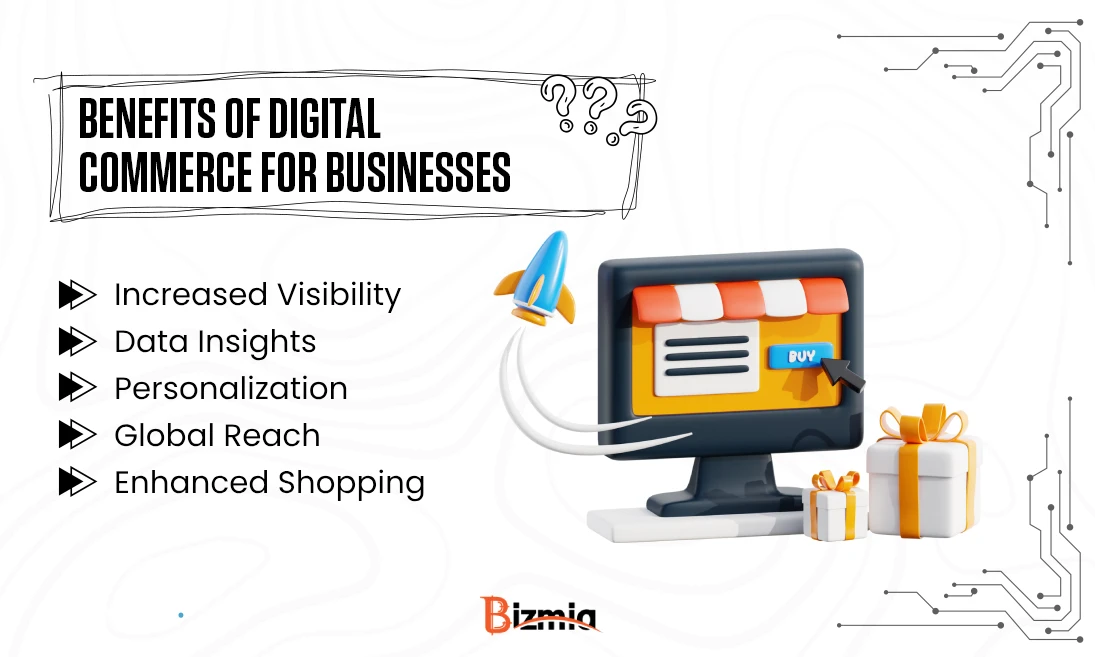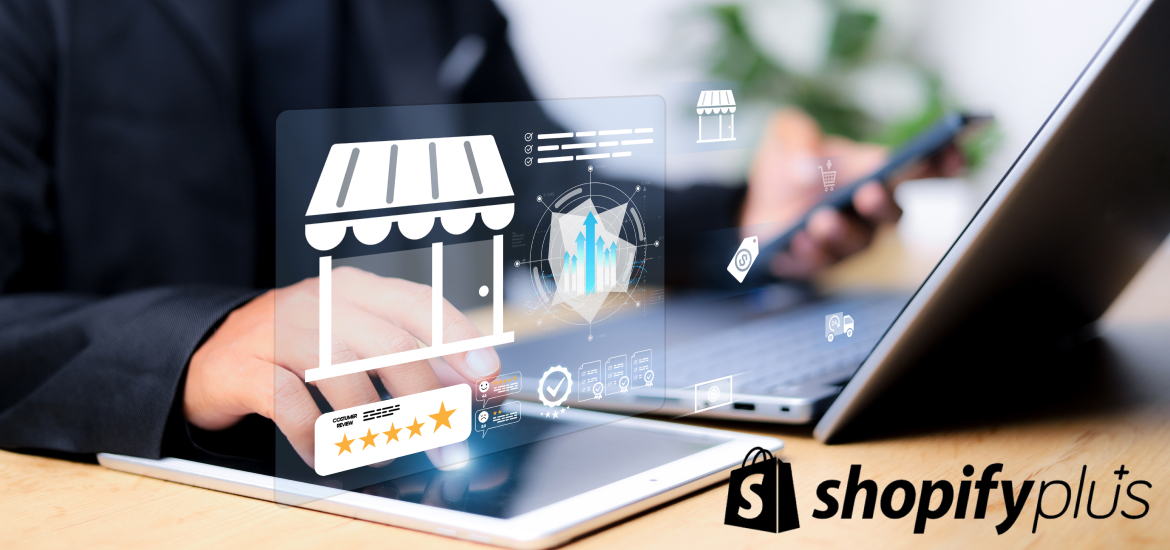If you are an owner of an eCommerce business, then the competition is fierce, and it is getting tougher every day. However, a set of tools and a full-fledged strategy that can help you attract, convert, and retain your customers is an absolute necessity. Here digital commerce can help you a lot and let us tell you how!
Table of Contents
What is Digital Commerce?
It covers all the processes and technologies involved in selling products and services online. This includes everything from first customer interaction and acquisition to post-buying activities.
The key elements that make up this process are:
- Search Engine Optimization (SEO).
- Market research.
- Writing product descriptions.
- Targeted social media ads.
- Customer relationship management.
- Data analysis & payment systems.
- Supply chain management & shipping logistics.
Now you have an idea about it, let’s see how it works.
How does it work?
The magic starts when a customer first interacts with a product or brand online. This can be via social media ads, search engine results, or Google ads.
For instance, on Alibaba, each user’s search results are tailored by an algorithm based on their search history, behavior, and location. Here each transaction helps in refining marketing strategies via data analytics and customer support.
Thus, digital commerce B2B or B2C focuses on enhancing the online shopping experience.

Now let’s see some of its features that can help you elevate your business!
Features of Digital Commerce
It focuses on making the buying process more personalized and some of its features that make it a favored choice are given below:
- Mapping of user experience.
- Customer services & pricing.
- Social media involvement.
- Content marketing (product description and photos).
- KPI & data analytics.
- Management of supply chain.
Indeed, it can be vital in measuring customer journeys and optimizing the whole process whereas Ecommerce is just one part of it.
Let us explain this further!!
Digital Commerce Vs Ecommerce
Ecommerce is just one part and to better understand it let us highlight the differences between the two!
| Digital Commerce | Ecommerce |
|---|---|
| It encompasses all efforts and processes that lead to making a purchase. | Ecommerce is all about selling goods & services online. |
| It involves analysis of user behavior like clicks and purchases to personalize the experience. | It is just a single part of the customer buying journey. |
| It also focuses on customer acquisition channels & activities related to retention. |
Digital commerce platforms are becoming popular because they are expanding their horizons. Such as the inclusion of Augmented Reality (AR), and Artificial Intelligence (AI) etc. to enhance user experience.
Let’s see some of the trends that are going to rule the Ecommerce world in 2024.
Digital Commerce Trends In 2024
Some of the top trends in this niche are given below:
1. Artificial Intelligence
Artificial Intelligence (AI) has the power to personalize the customer journey and 70% of the decision-makers designate AI as a vital component. This technology utilizes data analysis and machine learning techniques to assess customer behavior. That helps businesses in presenting relevant products automating the whole marketing strategy. Utilizing AI is essential to optimize and prepare your eCommerce store for the holiday season, ensuring a seamless shopping experience.
2. Chatbots
Chatbots offer instant customer support by addressing common questions and issues. They minimize the need for human intervention which is making their use widespread. A study by Gartner indicates that 25% of organizations will specifically use chatbots by 2027.
3. Headless Architecture
In this architecture, the front-end layer is detached from the backend which allows the owners to make changes in their frontend without interacting with the backend. This allows the easy management of inventory, orders, and processing of payments.
4. Voice Commands
Voice commands are popular nowadays as users can interact with digital devices without typing or clicking. In this, users can add items to their cart, place orders while driving, or multitask. For instance, virtual assistants like Alexa and Siri are best at taking voice commands and fulfilling tasks.
5. Augmented Reality
Augmented Reality (AR) technology can enhance the online shopping experience with virtual try-ons and product visualizations. Thus, making the shopping experience more interactive and immersive.
6 Mobile Optimization
Online shoppers operating via mobile are going to occupy 63% of the market according to Statista. Here the benefits of an eCommerce website are enormous keeping in mind its best mobile optimization.
Create a feature-rich & mobile optimized Ecommerce website with Bizmia
7. Image Search
Image search is considered the best Ecommerce tool because consumers can now use personal photos or images online to locate items.
With all these features and functionalities integrated into your Ecommerce website, you can have long-term success. However, choosing the right Ecommerce platform is necessary to ensure your stability.
Benefit for Your Business
There are going to be 2.64 billion online buyers as per Demand Sage which means an increase in Ecommerce website development. Here commerce digital can play a significant role in connecting Ecommerce websites with online shoppers and further enhance their shopping experience.
The other ways it can benefit businesses are given below:

Wrapping Up
We live in an age where customers are clear about their needs and understanding their requirements can help businesses make their efforts more targeted.
Here digital commerce services can be the long-term partner of your eCommerce business. To help you leverage the full advantage Bizmia cannot only help you develop an Ecommerce website but integrate all these features. Reach out to us today here.
Frequently Asked Questions
What are the main differences between ecommerce and digital commerce?
Ecommerce is all about buying and selling online whereas the other one refers to the whole user journey encompassing user first interaction to buying and retention.
What is the future of commerce digital?
Due to its convenience, personalization, and accessibility, it is surely the future of online shopping. Also, with the integration of AI, AR, and ML this niche is likely to grow more.












